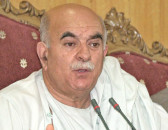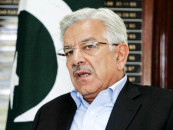SC judge takes jab at plea against NAB law
Justice Shah says challenge mounted by a person who himself ran away from parliament

Supreme Court Justice Mansoor Ali Shah remarked on Wednesday that the amendments to the National Accountability Bureau (NAB) laws were challenged by a person who himself ran away from parliament.
During the hearing of a petition filed by the Pakistan Tehreek-e-Insaf (PTI) Chairman Imran Khan against amendments to the National Accountability Ordinance (NAO), Justice Shah said that no citizen or financial institution mounted any challenge.
The petition is being heard by a three-member special bench. According to the judge, if the NAB amendments were such a big problem, any citizen would have challenged them. He added the court was approached by a person, who himself ran away from parliament.
Heading the bench, Chief Justice Umar Ata Bandial observed that accountability was the basis of democracy, adding that elections and votes were also a mechanism for accountability of government and members of parliament.
At the outset of the hearing, the chief justice greeted the Attorney General for Pakistan (AGP) by saying: “Good to see you.” The AGP said that remarks were attributed to him that he had acknowledged defects in the Supreme Court Practice and Procedure Act.
The chief justice told the AGP that in fact, he had admitted inconsistency in the laws and that the legislation made the chief justice a mere rubberstamp, but any review of the Practice and Procedure Act and the Review of Judgments Act was not a priority.
The bench said that in December and January, NAB had already given details of cases that were transferred after the NAB law amendments. However, it directed for the provision of the latest list of such cases.
Read CJ holds cards close to his chest
According to the bench, the important point in the present case was that the entire law had been violated. The chief justice remarked that many crimes were abolished, while the status of some had been changed.
The amendments made it extremely difficult to prove some offences. By reducing the minimum limit to Rs500 million, many cases had been taken out of the NAB jurisdiction, the chief justice observed.
The chief justice said that recovery of the corruption money was important but even if there was no recovery, at least the person responsible should be identified and punished. He also said that there were flaws in the NAB law and it had not been applied properly.
On that Justice Shah said that if the NAB amendments were such a big problem, a citizen would have challenged them. He also said the court had not been informed about which fundamental rights were violated by these amendments.
During the hearing, the chief justice said that thousands of people would come to the court if public notice was issued for the case. Senior lawyer, Makhdoom Ali Khan replied that the Supreme Court should issue the public notice.
However, the chief justice said that if the lawyer had presented the request earlier, the court would have accepted it but now a limited time was available. Later the hearing was adjourned until Thursday (today).
Wednesday marked the 50th hearing of the petition filed by Imran against the National Accountability (Second Amendment) Act 2022 passed by the then Pakistan Muslim League-Nawaz (PML-N)-led coalition government.
In the previous hearing, Justice Shah had request the chief justice for a second time to form a full bench. He asked whether the case should either be heard in the presence of an injunction on the Practice and Procedure law, or a full court should be constituted.



















COMMENTS
Comments are moderated and generally will be posted if they are on-topic and not abusive.
For more information, please see our Comments FAQ